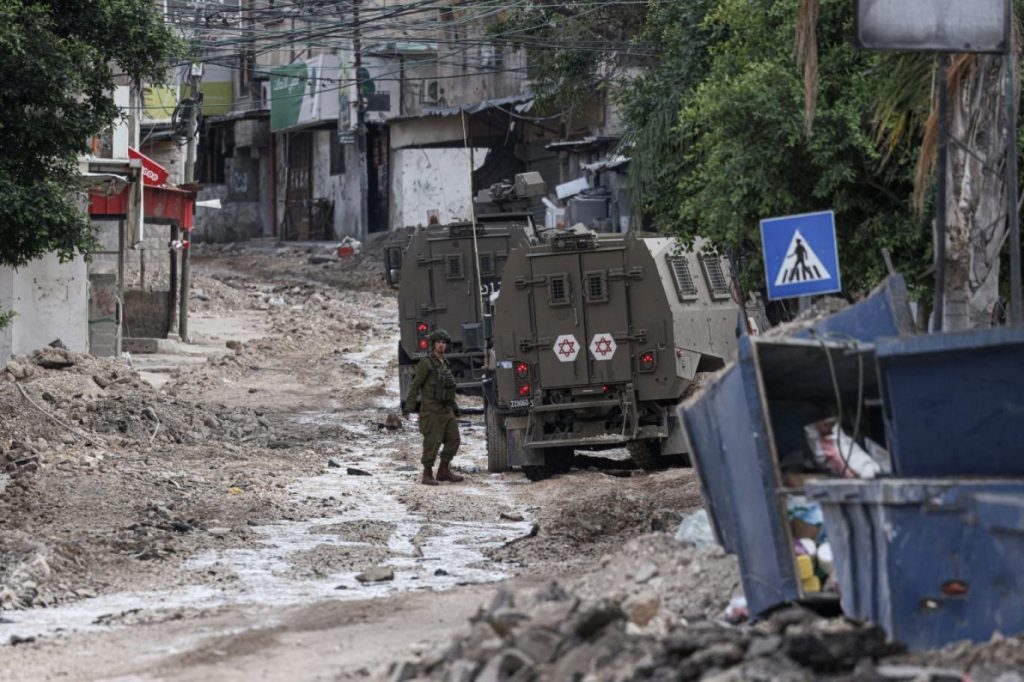Watan-Israel launched a new military campaign in the West Bank, starting from Jenin, just two days after the ceasefire agreement took effect in the Gaza Strip.
Below is an attempt to understand the developments in the West Bank following the aggression on Gaza:1. When did the operation, dubbed “Iron Wall,” begin?
The Israeli operation, called “Iron Wall” by the occupation, began on Tuesday. It involves hundreds of personnel from the army, police, and the internal security agency (Shin Bet).
These forces advanced into Jenin, backed by armored vehicles, bulldozers, and drones.
While Tel Aviv has not set a specific timeframe for the operation, some Israeli officials have indicated that it could continue for months.
2. What are the main areas of clashes?
So far, the Israeli attack has concentrated on the Jenin Governorate in the northern West Bank.
In addition to the Jenin refugee camp, which witnessed fierce clashes between the advancing forces and Palestinian resistance fighters, the Israeli army also stormed nearby towns, including Burqin, Qabatiya, Arraba, and Fahma.
Simultaneously, the occupation forces have fragmented the West Bank by erecting new military checkpoints and imposing stricter restrictions on Palestinian movement.

3. What is the toll of casualties and injuries?
As of Thursday, 12 Palestinians have been killed, and over 50 injured during the ongoing Israeli military operation. Most of the martyrs are from the Jenin refugee camp.
Additionally, the occupation forces have arrested dozens of Palestinians in the camp and forced hundreds to flee their homes.
4. Why is this happening now?
The Associated Press reported that this military campaign comes as Israeli Prime Minister Benjamin Netanyahu faces pressure from the far-right after his government reached a ceasefire and prisoner exchange agreement with Hamas.
The Wall Street Journal noted that Israel has shifted its focus to the West Bank, which it previously considered a secondary front during its war on Gaza and Lebanon.
The timing of the operation in Jenin has been linked to frustration among far-right Israeli officials over the ceasefire deal with Hamas, as they push for military escalation in the West Bank.
5. What are Israel’s objectives for this operation?
Prime Minister Benjamin Netanyahu commented on the military operation in Jenin, saying that Israel continues to act against “Iran’s axis” and its proxies in Gaza, Syria, Lebanon, Yemen, and what he called “Judea and Samaria” (the West Bank).
Finance Minister Bezalel Smotrich stated that the attack on Jenin would be a prelude to a strong and continuous campaign to protect settlers and the settlements housing 700,000 settlers.
Defense Minister Yoav Gallant said the army is currently applying “lessons” learned in Gaza to the West Bank, adding that efforts are underway to ensure that “terrorism” does not return to the Jenin camp and to prevent the establishment of a “terror front” against Israel from the east.
6. What is the stance of the Palestinian Authority and factions?
The Palestinian Ministry of Foreign Affairs condemned what it called aggression on Jenin and warned of Israeli plans to annex the West Bank.
Practically, the Palestinian Authority withdrew its security forces from the Jenin camp at the start of the Israeli military operation, claiming it was to avoid clashes with the attacking forces. However, Palestinian security agencies have continued targeting and arresting resistance fighters inside and outside the camp.
Hamas described the participation of the Palestinian Authority’s security forces in the occupation’s attack on Jenin as a betrayal of the Palestinian people and a dishonor to the martyrs’ blood.
Islamic Jihad also held the Palestinian Authority and its security forces responsible for their role in the aggression, accusing them of collaborating with the occupation by besieging the Jenin camp for over 40 days, as stated in a movement’s statement.
7. What are the anticipated consequences of this campaign?
Analysts told Al Jazeera that the military operation in Jenin and other areas of the West Bank is an attempt to destroy the resistance’s infrastructure. They suggested that the attack could later extend to other camps with active resistance movements.
The analysts also noted that this Israeli military campaign could bolster settlement expansion and pave the way for the annexation plan advocated by ministers in Netanyahu’s government.
The Associated Press highlighted that the developments in the West Bank could undermine the Gaza ceasefire agreement.
This operation might also backfire, as Israel acknowledges the possibility of major attacks being launched from the West Bank in the near future.
Palestinian resistance factions emphasized that the current Israeli military campaign would not break the will of the Palestinian people or their resistance.
